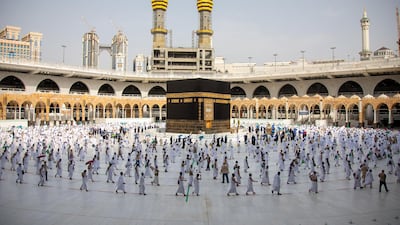For many Muslims around the world, Hajj, the annual pilgrimage made by Muslims to Mecca, is the trip of their lifetime. My late grandmothers recalled details of their trip for the remainder of their lives.
The pilgrimage is a once in a lifetime requirement of every Muslim if their financial situation and health permits it. Hajj holds valuable leadership lessons that could be applied to business and our daily lives.
It teaches us discipline. Hajj, which takes place over the course of a 6-day period, incorporates strict rituals performed in different sites including Mount Arafat, Mina, and Muzdalifa at certain specified time periods. Pilgrims, all dressed modestly in the same attire, are required to perform all rituals by following certain rules. Learning self-control, discipline, and setting certain rules for you and your team to follow could assist you in reaching your goal faster while eliminating distractions.
A second take away is the importance of time management. With only a limited number of days to perform Hajj, time management is of an essence. Pilgrims learn how to coordinate their time to perform rituals in a smoother manner. They do this by waking up earlier or performing rituals later when there are less people.
When my mother went to Hajj, she wanted to dedicate extra time for prayers, read long passages of the Holy Quran, and donate to the needy. Therefore she prepared a schedule beforehand and divided her time efficiently to be able to perform everything in the short time she was there. As a business owner, time management helps me prioritise and focus my time on what matters. It also helps me when working under tight deadlines and when under pressure.
Another important lesson is the value of teamwork and thinking of others. Though Hajj is a journey that could be performed individually and not as part of a group, the way rituals take place during the same time, requires the cooperation of everyone with the authorities. In normal times, before Covid-19, with more than 2 million of pilgrims around the holy sites, pilgrims realise to be safe and have a smooth journey they cannot be individualistic in their thinking. Accidents or stampedes are examples of what happens when people do not cooperate, as one of my grandmothers recalled once. In business, when you are part of a company, working together with your team helps yield the best results and realising targets faster and in an efficient manner.
Being patient is another important element. For many of my friends, Hajj was a beautiful experience however challenging for those not used to walking long distances, or comfortable around a sea of people. The journey is also a time where Muslims need to exercise extra restraint and focus on performing the required rituals amid the flurry of people. In many respects it puts one’s patience to the test. A relative of mine, an impatient young man by nature, told me he learned to hold his anger and collect himself at a number of occasions during Hajj, an exercise he found beneficial, which he carried forward in his everyday life. In business where reaping results may take time, patience is key.
A final lesson is that purpose is key in Hajj and life. Muslims go on Hajj to atone for their sins and return to their homes with a clean slate. That is the main purpose of Hajj. But perhaps Hajj’s ultimate lesson is the importance of having a goal that drives us to excel in business and life, much like the millions of Muslims around the world, who wait a lifetime to perform their pilgrimage.
Manar Al Hinai is an award-winning Emirati journalist and entrepreneur, who manages her marketing and communications company in Abu Dhabi

